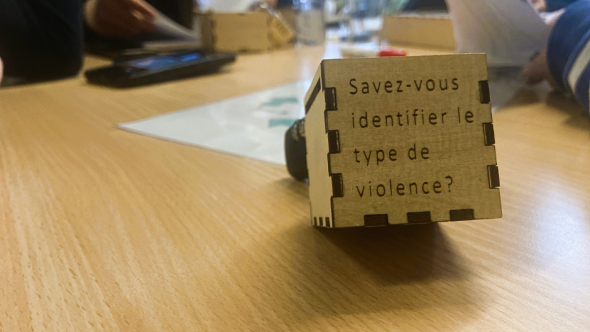The first edition was launched last year. This one, aimed at Block 3 Medicine students at UNamur was a resounding success.
For the second edition of the initiative, the academic team decided to involve Block 3 Midwifery students at Hénallux in the project, inviting them to collaborate with Block 3 Medicine students during the escape game. "This year, we're going one step further. In addition to remaining in a primary care setting, the emphasis is on the interdisciplinary aspect of the project.", explains Hélène Givron, pedagogical coordinator and Senior Lecturer in the Department of Psychology at UNamur. "We know that to fight domestic violence most effectively and come to the aid of victims, an interprofessional approach is paramount. Being able to sensitize future doctors with our expertise as midwives is therefore a fantastic opportunity to reinforce complementarities in patient care. " enthuse Milena Jarosik, pedagogical coordinator, and Sophie Evrard, "Gender" contact person, both midwifery teachers at the Hénallux paramedical department.
At a time when teaching (inter)professional communication in healthcare is still underdeveloped, the escape game fills this gap by covering two key areas in training: communication between healthcare professionals and that between professionals and patients. Offering the escape game to both professions simultaneously was made possible by the "Ann-Lawrence Durviaux" Solidaris Prize, which rewards projects that combat domestic violence. Indeed, in 2022, Milena Jarosik and Sophie Evrard, the two designers of the activity, received funding enabling the escape game to be developed, professionalized and extended to other students.
Ten closed boxes, each containing an enigma, were used to guide participants through the game. Divided into small groups, students had 45 minutes to "dare to ask the right questions" and solve the riddles. The session concludes with a debriefing to mobilize knowledge about domestic violence, capitalize on the key notions addressed in the riddles and encourage transfer to professional practice. This collaboration between students from the two professions also enables a better understanding of each other's roles and limits, thus fostering interprofessional communication and collaboration.
The "Dare you ask the question" project therefore stands out as a unique educational initiative in higher education and a first-of-its-kind collaboration in Wallonia to tackle a weighty and sensitive theme. "At UNamur, we have been developing this innovative teaching based on recommendations from scientific literature for 7 years, while regularly evaluating it to improve it. The literature indicates that doctors do not feel sufficiently trained to identify and address domestic violence with their patients. The law of silence characterizes these situations. And yet, thinking about domestic violence in diagnostic hypotheses is a prerequisite for identifying the people concerned. This escape game meets this training need. It will subsequently be the subject of research to evaluate its effects. ", explains Hélène Givron.
